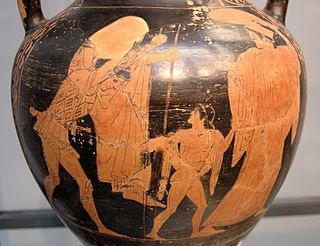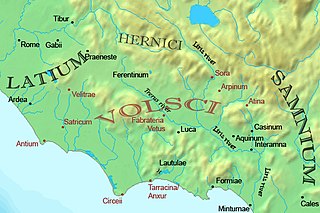
In Greco-Roman mythology, Aeneas was a Trojan hero, the son of the Trojan prince Anchises and the Greek goddess Aphrodite. His father was a first cousin of King Priam of Troy, making Aeneas a second cousin to Priam's children. He is a minor character in Greek mythology and is mentioned in Homer's Iliad. Aeneas receives full treatment in Roman mythology, most extensively in Virgil's Aeneid, where he is cast as an ancestor of Romulus and Remus. He became the first true hero of Rome. Snorri Sturluson identifies him with the Norse god Víðarr of the Æsir.

Latinus was a figure both in Greek and Roman mythology. He is often associated with the heroes of the Trojan War, namely Odysseus and Aeneas. Although his appearance in the Aeneid is irreconcilable with his appearance in Greek mythology, the two pictures are not so different that he cannot be seen as one character.

Ascanius was a legendary king of Alba Longa and is the son of the Trojan hero Aeneas and Creusa, daughter of Priam. He is a character in Roman mythology, and has a divine lineage, being the son of Aeneas, who is the son of the goddess Venus and the hero Anchises, a relative of the king Priam; thus Ascanius has divine ascendents by both parents, being descendants of god Jupiter and Dardanus. He is also an ancestor of Romulus, Remus and the Gens Julia. Together with his father, he is a major character in Virgil's Aeneid, and he is depicted as one of the founders of the Roman race.

In Roman mythology, Lavinia is the daughter of Latinus and Amata, and the last wife of Aeneas.

Tullus Hostilius was the legendary third king of Rome. He succeeded Numa Pompilius and was succeeded by Ancus Marcius. Unlike his predecessor, Tullus was known as a warlike king who, according to the Roman historian Livy, believed the more peaceful nature of his predecessor had weakened Rome. It has been attested that he sought out war and was even more warlike than the first king of Rome, Romulus. Accounts of the death of Tullus Hostilius vary. In the mythological version of events Livy describes, he had angered Jupiter who then killed him with a bolt of lightning. Non-mythological sources on the other hand describe that he died of plague after a rule of 32 years.
In ancient Rome, a gens was a family consisting of individuals who shared the same nomen gentilicium and who claimed descent from a common ancestor. A branch of gens, identified by the cognomen, was called a stirps. The gens was an important social structure at Rome and throughout Italia during the period of the Roman Republic. Much of individuals' social standing depended on the gens to which they belonged. Certain gentes were classified as patrician, others as plebeian; some had both patrician and plebeian branches. The importance of the gens as a social structure declined considerably in imperial times, although the gentilicium continued to define the origins and dynasties of the ancient Romans, including the Emperors.
The Albans were Latins from the ancient city of Alba Longa, southeast of Rome. Some of Rome's prominent patrician families such as the Julii, Servilii, Quinctii, Geganii, Curiatii and Cloelii were of Alban descent.
Gaius Cluilius was the king of Alba Longa during the reign of the Roman king Tullus Hostilius in the mid seventh century BC. Alba Longa was an ancient city of Latium in central Italy southeast of Rome.

The kings of Alba Longa, or Alban kings, were a series of legendary kings of Latium, who ruled from the ancient city of Alba Longa. In the mythic tradition of ancient Rome, they fill the 400-year gap between the settlement of Aeneas in Italy and the founding of the city of Rome by Romulus. It was this line of descent to which the Julii claimed kinship. The traditional line of the Alban kings ends with Numitor, the grandfather of Romulus and Remus. One later king, Gaius Cluilius, is mentioned by Roman historians, although his relation to the original line, if any, is unknown; and after his death, a few generations after the time of Romulus, the city was destroyed by Tullus Hostilius, the third King of Rome, and its population transferred to Alba's daughter city.

Alba Longa was an ancient Latin city in Central Italy in the vicinity of Lake Albano in the Alban Hills. The ancient Romans believed it to be the founder and head of the Latin League, before it was destroyed by the Roman Kingdom around the middle of the 7th century BC and its inhabitants were forced to settle in Rome. In legend, Romulus and Remus, founders of Rome, had come from the royal dynasty of Alba Longa, which in Virgil's Aeneid had been the bloodline of Aeneas, a son of Venus.

The gens Cloelia, originally Cluilia, and occasionally written Clouilia or Cloulia, was a patrician family at ancient Rome. The gens was prominent throughout the period of the Republic. The first of the Cloelii to hold the consulship was Quintus Cloelius Siculus, in 498 BC.
The gens Curiatia was a distinguished family at Rome, with both patrician and plebeian branches. Members of this gens are mentioned in connection with the reign of Tullus Hostilius, the third King of Rome, during the seventh century BC. The first of the Curiatii to attain any significant office was Publius Curiatius Fistus, surnamed Trigeminus, who held the consulship in 453 BC. The gens continued to exist throughout the Republic, and perhaps into imperial times, but seldom did its members achieve any prominence.
Agrippa is a Latin praenomen, or personal name, which was most common during the early centuries of the Roman Republic. It was sometimes abbreviated Agr., or occasionally Agripp.; both forms are found in the Fasti Capitolini. Despite ending in -a, it is a masculine name. The feminine form was probably Agrippina, which is also found as a cognomen, or surname, but no examples of its use as a praenomen have survived.

The Latins, sometimes known as the Latials or Latians, were an Italic tribe which included the early inhabitants of the city of Rome. From about 1000 BC, the Latins inhabited the small region known to the Romans as Old Latium, that is, the area between the river Tiber and the promontory of Mount Circeo 100 km (62 mi) southeast of Rome. Following the Roman expansion, the Latins spread into the Latium adiectum, inhabited by Osco-Umbrian peoples.
Mettius is a Latin praenomen, or personal name, which was used in pre-Roman times and perhaps during the early centuries of the Roman Republic, but which was obsolete by the 1st century BC. The feminine form is Mettia. The patronymic gens Mettia was derived from this praenomen. The name was rare in historical times, and not regularly abbreviated.
Octavius Mamilius was princeps of Tusculum, an ancient city of Latium. He was the son-in-law of Lucius Tarquinius Superbus, the seventh and last king of Rome. According to tradition, the gens Mamilia was descended from Mamilia, reputedly a granddaughter of Ulysses (Odysseus) and Circe. Titus Livius described Octavius as head of one of the most distinguished families of Latium, and thus an important ally of Tarquinius.
Proculus is a Latin praenomen, or personal name, which was most common during the early centuries of the Roman Republic. It gave rise to the patronymic gentes Proculeia and Procilia, and later became a common cognomen, or surname. The feminine form is Procula. The name was not regularly abbreviated.
Tiberius is a Latin praenomen, or personal name, which was used throughout Roman history. Although not especially common, it was used by both patrician and plebeian families. The feminine form is Tiberia. The name is usually abbreviated Ti., but occasionally Tib.

The Latin War was a war fought between the Roman Republic and the Latin League from 498 BC to 493 BC.











